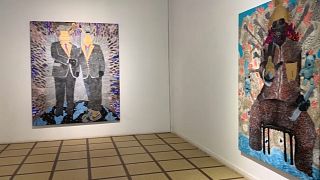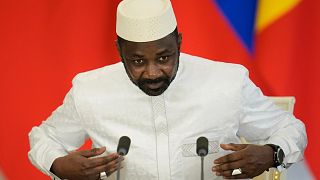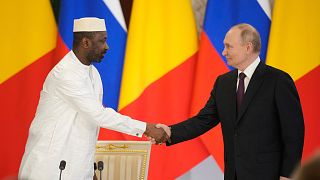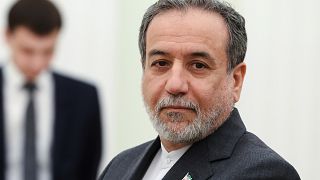Mali
Malian artist Abdoulaye Konate uses Sahel-specific colours and fabrics to draw attention to social problems and bring together unique works of African contemporary art with enthusiasts.
One of the 59 artists in the official selection of the 14th Dakar Biennial, Konate's works in the field of contemporary art are exhibited under a special title called "The Master/Le Maitre" by the biennial management.
While the old palace of justice in Dakar hosts the works in the official selection of the biennial, Konate's works are presented to art lovers with a special lighting method in the largest courtroom of the palace of justice.
In the hall, where countless trials were held from 1958 to 1992, visitors are greeted by installations up to 6 metres in size, created from the colours and patterns used by the Tawaric society.
The installations, which resemble a giant painting when viewed from a distance, consist of hundreds of rectangular pieces sewn from colourful bright fabrics called "bazin", which are frequently used in West Africa.
In his installations, Konate draws inspiration from many different subjects, from the terrorism problem in the Sahel to the ancient Ashanti Empire in Ghana.
One of Mali's most important visual artists, 69-year-old Konate told AA correspondent about his art life and the starting point of his works in the hall where his works are exhibited.
- "I was inspired by the nights I spent in the desert during my childhood"
Konate said that he started his art life at the Mali National Arts Institute in Bamako and then studied plastic arts in Havana, the capital of Cuba.
Noting that he worked in genres such as painting and acrylic, Konate said, "I started to make installations with fabrics, influenced by the traditional clothes of artists, singers and even hunter societies."
Konate underlined that the inspiration for some of his works was the desert memories of his childhood and said, "You can see various shades of blue in my work titled 'Blue Moon'. When I was a child, I loved to watch the moon on the nights we stayed in the desert. When the moonlight fell on the desert, it would take on an amazing blue tone. That image will be engraved in my memory that it inspired me in painting and acrylic as well as installations."
Noting that his childhood was spent in the desert and he witnessed many cultures, Konate stated that he was influenced by the life practices of ethnic groups such as Fulani, Berber, Malinke, Soninke as well as elements from the Tevarik society in his works.
- "I wanted to shed light on Mali's terrorism problem"
Noting that his works focus on two themes, "visual aesthetics" and "social message", Konate stated that he mostly emphasised the terrorism problem in Sahel in the social message section.
Konate continued as follows:
"With the 3 installations titled 'Death Sentence', 'Red Drops (Sahel's blood)' and 'No to Religious Fanaticism', I wanted to shed light on the terrorist attacks and extremist movements that Mali has been the victim of. It was also my idea to exhibit my installations in the courtroom, because I think this place is very suitable in terms of both size and the message it carries. For example, it is very exciting to exhibit 'Death Sentence' on the wall of an old courtroom that witnessed many trials. Such a space reinforces and increases the impact of the work and the message it wants to convey."
- "We work non-stop for 8-10 months with a team of 5 people"
Konate pointed out that the installations emerged with a team of 5 people as a result of long efforts and said, "We complete the works with my 5 assistants in an average of 8-10 months, working non-stop 7 days a week. We use more than 2-3 thousand pieces of fabric in some and more than 10 thousand in others. We go over each fabric at least 7 times with a machine. In addition to the message that the work wants to give, it is also very important for me that the technical part, especially the final version, is perfect."
Konate added that the world, but especially Mali, needs tolerance and tolerance, but that extremist ideas can be prevented through dialogue.











00:51
Marrakech national festival: honoring the legacy of popular arts
02:20
Young designers grace the runway at Fashion Finest Africa’s show in Lagos
00:58
Senegalese PM Sonko says international order is shifting to a more balanced, multilateral world
01:00
Pix of the Day: July 3, 2025
01:12
Senegal: Ousmane Sonko's defamation conviction upheld by Supreme Court
Go to video
Senegal’s finest sheep vie for bloodline prestige at pageant